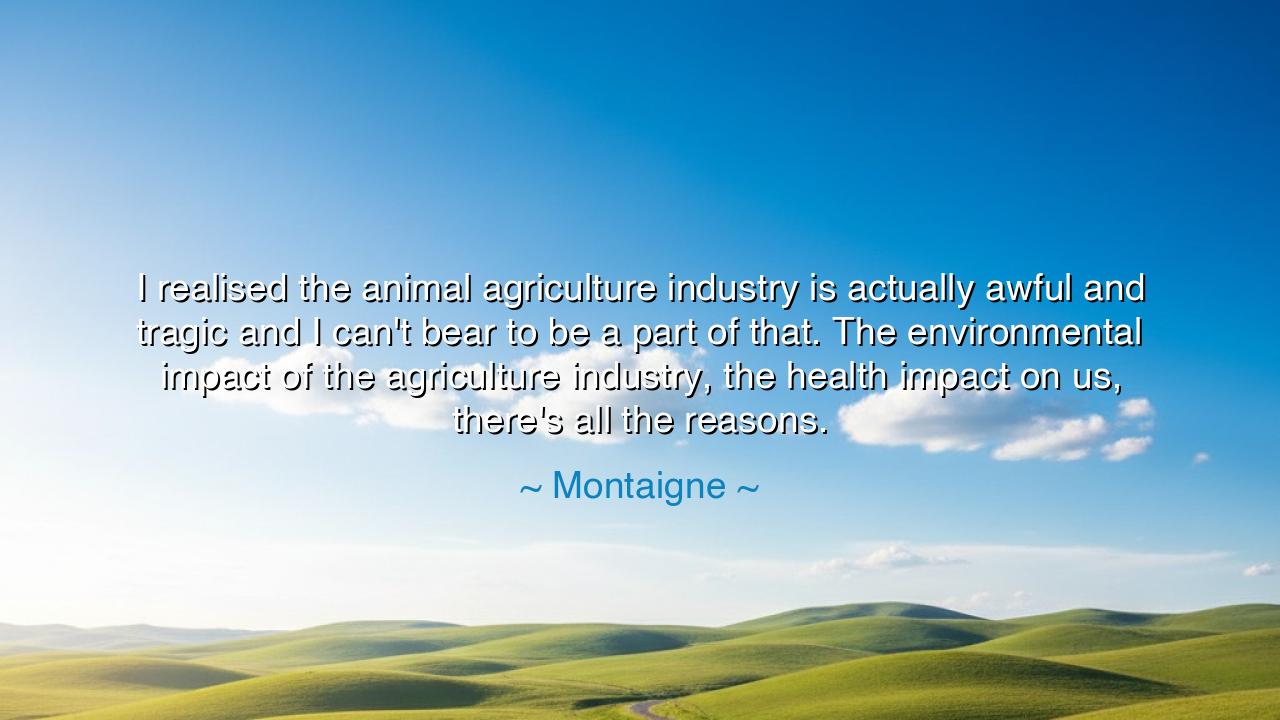
I realised the animal agriculture industry is actually awful and
I realised the animal agriculture industry is actually awful and tragic and I can't bear to be a part of that. The environmental impact of the agriculture industry, the health impact on us, there's all the reasons.






Hear the stirring words of Montaigne: “I realised the animal agriculture industry is actually awful and tragic and I can't bear to be a part of that. The environmental impact of the agriculture industry, the health impact on us, there's all the reasons.” These words resound not only as a confession of the heart but as a testimony of awakening. They carry the sorrow of seeing truth unveiled, the pain of recognizing complicity in harm, and the courage of choosing a new path. In them lies a call to conscience: to see beyond the veil of habit and to reckon with the weight of our choices upon the earth, upon the animals, and upon our own flesh.
The animal agriculture industry, though cloaked in the language of nourishment and prosperity, hides within itself immense suffering. Beasts once roaming free across field and forest are confined to cages, bred only for slaughter, their cries unheard amidst the machinery of profit. To call this industry “tragic” is no exaggeration, but a lamentation for lives treated as commodities rather than companions. The ancients taught that humanity was given stewardship, not dominion of cruelty. Yet in the vast halls of modern farms, stewardship has withered into exploitation, and the sacred covenant between man and beast lies broken.
But Montaigne does not stop at the sorrow of animals—he speaks also of the environmental impact. For the cost of animal agriculture is not borne by animals alone, but by the earth itself. Forests fall beneath axes to make way for grazing herds; rivers run dry to water endless fields of feed; the sky itself warms as gases rise from billions of animals confined for human desire. History teaches us that civilizations which devour their land without care are doomed to fall. The collapse of the Mayan cities, the desolation of Mesopotamia—both remind us that when people exhaust the soil and water for short-lived gain, the land eventually turns against them.
And what of the health impact Montaigne speaks of? Here too lies truth. For a diet heavy with the flesh of animals and the products of factory farms has been shown to burden the human body with sickness—diseases of the heart, ailments of blood and digestion. The very fuel we consume can either lengthen our days in strength or shorten them in suffering. Thus, the harm of this industry is threefold: it crushes animals in torment, it ravages the environment, and it burdens human health. Truly, as Montaigne says, there are “all the reasons” to turn away from it.
Consider the story of Ashoka, the great emperor of India. Once a conqueror drenched in blood, he awakened to the horror of his deeds and turned instead to the path of compassion. He declared protections for animals, forbade needless slaughter, and promoted harmony with nature. His empire, once feared for its cruelty, became remembered for its justice and kindness. This transformation echoes Montaigne’s words: to awaken is not to despair, but to change one’s course and to become an example for others.
The lesson for us is clear: we must examine the hidden cost of what we eat, not only upon ourselves but upon the world around us. To live with wisdom is to ask not merely, “Does this satisfy my hunger?” but, “What suffering lies upon this plate? What toll upon the earth? What weight upon my body?” Each meal becomes a choice between perpetuating tragedy and participating in healing.
Practical action lies within reach of all. Reduce or eliminate dependence on the animal agriculture industry. Embrace foods that nourish without cruelty—grains, fruits, vegetables, seeds, and legumes. Support farmers who cultivate the land with respect for soil, water, and life. Speak to others of what you have learned, not with condemnation, but with invitation: that they too might awaken to the deeper joy of living in harmony with all beings.
Thus, Montaigne’s words are a torch of awakening. They remind us that change is not only possible but urgent. To reject cruelty, to safeguard the earth, to honor our bodies—this is the path of wisdom. Let each of us take up the burden of conscience and turn it into the blessing of action. For in so doing, we shall not only live more gently, but also leave a world more whole for those yet to come.






AAdministratorAdministrator
Welcome, honored guests. Please leave a comment, we will respond soon